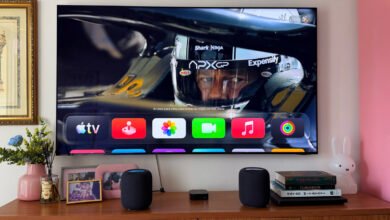Apple TV Accelerates Its Streaming Ambitions

▼ Summary
– Apple TV is undergoing significant changes including a rebrand, its first standalone bundle with Peacock, and a major $750 million Formula One rights deal.
– Despite launching six years ago with premium original content, Apple TV still struggles for audience share and lacks any top 10 streaming titles.
– Apple has not disclosed official subscriber numbers, though executives claim it exceeds analyst estimates of 45 million subscribers.
– The service is expanding through partnerships like the Peacock bundle and Amazon Prime Video Channels to increase accessibility and viewership.
– Apple’s sports strategy focuses on exclusive rights like Formula One and MLS to control user experience and differentiate from traditional broadcasting.
Six years after its initial debut, Apple TV is undergoing a significant transformation, marked by a strategic rebranding, its first independent bundle agreement with a rival service, and a landmark acquisition of exclusive sports rights. These moves signal a concerted effort by the technology powerhouse to expand its subscriber base and enhance its standing in the competitive streaming arena.
The platform, known for its high-quality original programming, has faced challenges in achieving widespread adoption. Industry data places its viewership share in a category below several niche networks, and it currently lacks any titles ranking among Nielsen’s top ten most-streamed shows or films. While Apple has not published official subscriber numbers, a senior executive recently indicated the total is “substantially more” than the 45 million estimated by external analysts.
This context makes the recent strategic shifts all the more noteworthy. The service was rebranded from Apple TV+ to Apple TV, a change the company described as a “vibrant new identity.” Shortly after, a major partnership was announced with NBCUniversal to create a bundle combining Apple TV and Peacock. Both services have been considered smaller players in the streaming world and have historically been hesitant to form such alliances outside of telecom agreements. An Apple executive stated this bundle will “bring Apple TV’s beloved shows and movies to more viewers in more places.”
The week was capped off with a blockbuster $750 million deal for the U.S. broadcast rights to Formula One racing. This acquisition aligns with the company’s forward-looking philosophy. An Apple leader expressed that securing F1 was a long-held ambition, noting that from its 2019 launch with just nine original series, the platform has grown to a library of over 300 shows and movies. He emphasized that this deal will deliver “the best stories from the most creative storytellers” and provide U.S. subscribers with comprehensive F1 coverage, highlighting a focus on quality and incredible content.
Although the timing of the Peacock bundle and the F1 agreement was called a “coincidence,” it collectively points to a new direction for Apple’s streaming service. This involves a new name, a revised bundling strategy, and expanded sports ambitions, which had previously been limited to Major League Soccer and Friday night Major League Baseball games.
Regarding the sports strategy, the Apple executive explained the goal is to offer fans easy, reliable access in one consistent location, removing the complexities often associated with watching live sports. For F1 enthusiasts, this partnership promises an incredibly straightforward viewing experience with new capabilities, made possible by close collaboration between Apple and the racing organization. An industry analyst noted that this reflects Apple’s strategic approach to live sports, prioritizing exclusive rights that grant complete control over the user experience rather than adhering to traditional broadcasting models.
Beyond the Peacock arrangement, Apple has pursued other partnerships over the past year to widen its service’s reach. These include a deal with Amazon to make Apple TV available through Prime Video Channels and a collaboration with Chase to provide complimentary subscriptions to Apple TV and Apple Music for Sapphire Reserve cardholders.
These strategic choices have also captured the attention of the creative community, which Apple has actively supported through its prestigious, star-studded original productions. A prominent director and producer commented that broader distribution through bundling is beneficial because it allows more people to see their work, acknowledging the difficult choices consumers must make in a crowded streaming market.
Within the advertising industry, marketing experts are watching these developments closely. Recent changes, including a significant 30 percent price increase for the service in August, have led to speculation about what might come next. A major question is whether Apple will introduce a cheaper, ad-supported subscription tier. Presently, Apple TV remains the only major streaming service without such an option, though it does incorporate limited advertising during its MLS and Friday night MLB broadcasts. A source familiar with the matter confirmed that F1 coverage will include commercials, though, consistent with past ESPN coverage, there will be no ads while cars are actively racing during Grand Prix events.
Industry observers also point out that Apple has been recruiting numerous veterans from the television and streaming video sectors over the last couple of years. This hiring trend, combined with its newfound willingness to form distribution deals, strongly suggests the company has much broader ambitions for its streaming platform.
The CEO of Formula One summarized the broader perspective, stating that when discussing Apple, one is talking about more than just technology or connectivity, it’s about social relevancy. With considerable social currency already in hand, Apple now aims to leverage the popularity of Formula One, its refreshed brand identity, and its new partnerships to achieve a new level of relevance in the streaming world.
(Source: Hollywood Reporter)



